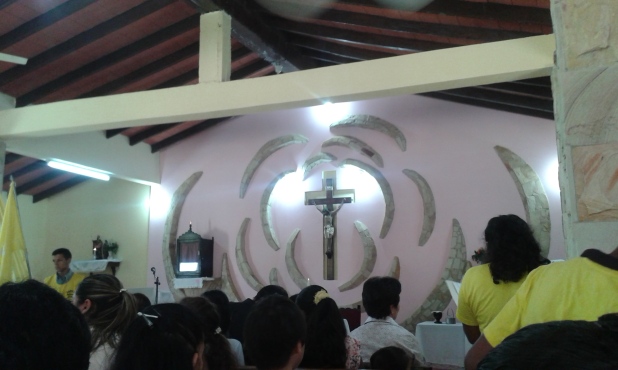It is not necessary for me to say, but it is worth sharing two facts. First, the Paraguayans I know understand the world as Catholics. They may not go to church all the time, but they think about Jesus often and use God to explain most things. Social lives are largely centered around the church. Many of the biggest parties and drinking events spring from patron saint celebrations. Second, I am not Catholic. But, my beliefs do not prevent me from participating in Catholic religious activities if and when I want.
I traveled to Paraguay with the desire to help make the world better, but I came here as a student. My openness and curiosity to experience and to understand how Paraguayans practice Catholicism has given me great insight, despite putting me in the occasional uncomfortable situation. “Catholic” has come to represent, in my mind, the life philosophy of some of my closet Paraguayan friends. These days, when I go to a church function it’s not only to learn what issues my community thinks are important enough to bring before their God, but also because a friend invited me. For example, I know it means a lot to my señora friend when I do the rosary with her, and her happiness is enough to dedicate 60 minutes of my day to her God every so often.
It is impossible to escape Catholicism in Paraguay if one lives here and talks to Paraguayans. If one mentions an event in the future or tries to make plans to do something Paraguayans say it will happen “if God and the Virgin Mary permit it.” If one talks about marriage, it involves the church. If someone is sick or something is bad one prays. Families are divided by the Catholic Bible study to which they send their children. Public buses have Jesus painted on them and tout slogans like, “My path is guided by Jesus.” Passengers on buses cross themselves when they pass churches and cemeteries. Churches host parties and cookouts. People wear crosses and have saints’ cards in their wallets, religious photos as their profile pictures, and Jesus images hanging on their bedroom walls.
The way I see it, Jesus and Mary are Paraguay’s way of setting a moral code and giving meaning to life. In the end, it doesn’t matter that my Paraguayan friends and I have different reasons for why we think it is right to be honest or to treat people with dignity. What is important is that we share the values of truthfulness and respect.
I never needed to think about what “tolerance” meant before coming to Paraguay. But, Paraguayan tolerance is how my community embraced me and my tolerance is why I have learned and done so much since coming here. Paraguay has taught me that tolerance is not just letting people practice their customs in peace. It is being open to learning how people’s cultural practices relate to their lives in general and, more profoundly, what their beliefs boil down to in their simplest form. We all have a lot to learn from people who see the world differently from us. And, we all have more values in common than it might seem at first glance.





